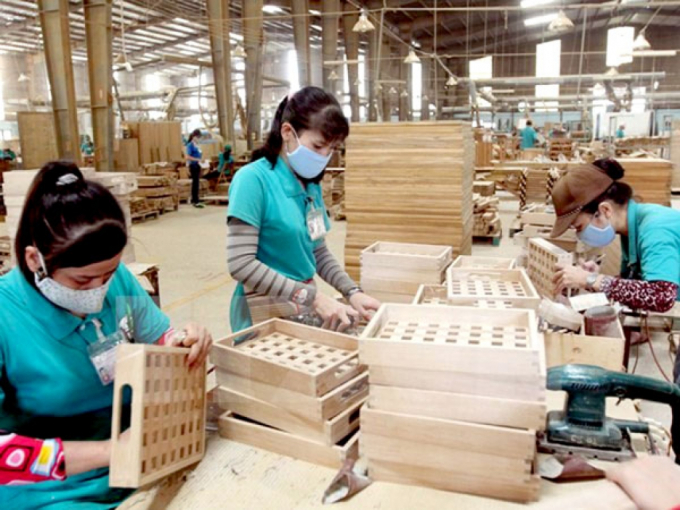May 25, 2025 | 11:31 GMT +7
May 25, 2025 | 11:31 GMT +7
Hotline: 0913.378.918
May 25, 2025 | 11:31 GMT +7
Hotline: 0913.378.918

Vietnam’s wood industry has taken proactive steps to meet the requirements of the EU Deforestation Regulation (EUDR).
At the seminar "Green Transition: From Pressure to Business Opportunity" organized by Nguoi Lao Dong newspaper on February 19, Pham Minh Quang from the European-American Market Department of the Ministry of Industry and Trade highlighted that Europe and the U.S. are Vietnam's two largest export markets. Moreover, these regions have introduced new sustainability regulations that directly impact the Vietnamese business community.
Notably, in the EU market, two key regulations—the Carbon Border Adjustment Mechanism (CBAM) and the EU Deforestation Regulation (EUDR)—are affecting major Vietnamese industries, particularly those linked to agriculture, such as fertilizers, timber, coffee, and rubber.
Associate Professor Dr. Nguyen Dinh Tho, Director of the Institute for Strategic Policy under the Ministry of Natural Resources and Environment, stated that both green transition and digital transformation have become inevitable requirements in the current global context. He also emphasized that digital transformation is a crucial tool in accelerating the green transition within the economy.
One of the biggest challenges to the green transition stems from global political and economic shifts. The administration of U.S. President Donald Trump has made significant policy adjustments, including budget cuts for green transition initiatives. However, Europe and China have remained committed to their transition goals.
For the European Union, strict regulations such as the IUU yellow card for seafood exports, CBAM, and EUDR are creating risks of supply chain disruptions globally. On the other hand, they are exerting significant pressure on Vietnamese agricultural, forestry, and fishery exporters. Associate Professor Dr. Nguyen Dinh Tho stressed that the green transition in the economy has become a mandatory requirement worldwide. Failure to comply means that businesses will face a high risk of being excluded from the market or even going bankrupt.
The textile industry is a clear example of the necessity of green transition. Accordingly, Vietnam’s textile exports declined significantly in 2022 and 2023 due to delays in adopting green standards. Conversely, Bangladesh, which promptly embraced the green transition, saw strong export growth. In 2024, political instability in Bangladesh provided Vietnamese textile businesses with a chance to recover and reach their export levels.
Several industries have successfully adopted green transition measures and maintained stable exports, with the wood sector being a notable example. According to Nguyen Chanh Phuong, Vice Chairman of the Handicraft and Wood Industry Association of Ho Chi Minh City (HAWA), Vietnam’s wood industry was an early adopter of green transition strategies. As a result, the sector has actively integrated sustainability criteria into its overall development plans since 2018.
When the EU introduced EUDR, many countries around the world were skeptical about its standards. However, Vietnam—especially the Ministry of Agriculture and Rural Development—proactively took steps to comply. Due to the regulation’s technical complexities, the EU postponed its implementation from January 1, 2025, to January 1, 2026. Despite this delay, the Vietnamese business community has prepared to meet EUDR requirements as soon as they take effect.
Vice Chairman Nguyen Chanh Phuong highlighted that Vietnam has previously enforced a policy prohibiting the exploitation of natural forests. However, the country’s wood and wood product exports have continued to experience monumental growth, reaching a record level of 16.3 billion USD in 2024.
Dinh Hong Ky, Vice Chairman of the Ho Chi Minh City Business Association, noted that financial barriers remain one of the biggest challenges in the green transition process. Statistics indicate that approximately 65% of businesses face difficulties in accessing capital for green projects. Despite the availability of financial support mechanisms, granting funds to the appropriate business remains a considerable difficulty.
The Ministry of Agriculture and Environment must clearly define its duties and functions to meet practical demands in promoting the green transition. Environmental protection must take precedence over all economic and social activities, while the transition to a sustainable, multi-objective agricultural economy must prioritize food security and development space.
According to the Deputy Prime Minister, the Ministry’s organizational structure must be based on a review of its assigned functions and responsibilities. At the same time, it must address overlapping management issues between various ministries, between central and local authorities, and between state regulatory agencies and public service units or the business community.
Translated by Nguyen Hai Long

(VAN) The People's Committee of Tra Vinh province has approved an adjustment to the investment policy for the Green Hydrogen Plant project, increasing its area to approximately 52.76 hectares.
![Reducing emissions from rice fields: [2] Farmers’ commitment to the soil](https://t.ex-cdn.com/nongnghiepmoitruong.vn/608w/files/news/2025/05/05/dsc08881jpg-nongnghiep-140632.jpg)
(VAN) Clean rice cultivation model in Thuong Tan commune, Bac Tan Uyen district, is assisting local residents in achieving sustainable agriculture by substantially reducing costs, increasing productivity, and protecting the environment.

(VAN) At the conference to disseminate Resolution No. 68, AgriS introduced its digital agricultural ecosystem and reaffirmed its commitment to accompanying the Government in promoting private sector development and sustainable agriculture.

(VAN) 'Blue Ocean - Blue Foods' initiative is designed to restore marine ecosystems and establish sustainable livelihoods for local communities by cultivating a minimum of 1,000 hectares of cottonii seaweed in the first three years.
/2025/05/21/4642-3-112707_603.jpg)
(VAN) The V-SCOPE project has made direct contributions to three out of six pillars of the Comprehensive Strategic Partnership between Vietnam and Australia.

(VAN) Facing the threat of rabies spreading to the community, Gia Lai province urgently carries out measures to vaccinate dogs and cats on a large scale.

(VAN) Disease-free livestock farming not only protects livestock herds but also stabilizes production and livelihoods for many farmers in Tuyen Quang.